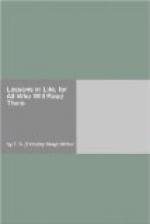“It is too late now,” was Mr. Wilson’s prompt reply.
“Too late! How so?”
“We have procured a lot.”
“Mr. Wilson!” Poor Smith started to his feet in chagrin and astonishment.
“Yes; we have taken one of Jones’s lots, on the west side of the city. A beautiful ten-acre lot.”
“You have!” Smith was actually pale.
“We have; and the title-deeds are now being made out.”
It was some time before Smith had sufficiently recovered from the stunning effect of this unlooked-for intelligence, to make the inquiry—
“And pray how much did Jones ask for his ten-acre lot?”
“He presented it to the city as a gift,” replied the councilman.
“A gift! What folly!”
“No, not folly—but true worldly wisdom; though I believe Jones did not think of advantage to himself when he generously made the offer. He is worth twenty thousand dollars more to-day than he was yesterday, in the simple advanced value of his land for building-lots. And I know of no man in this town whose good fortune affects me with more pleasure.”
Smith stole back to his home with a mountain of disappointment on his heart. In his cupidity, he had entirely overreached himself, and he saw that the consequences were to react upon all his future prosperity. The public square at the west end of the town would draw improvements in that direction all the while increasing the wealth of Mr. Jones, while lots in the north end would remain at present prices, or, it might be, take a downward range.
And so it proved. In ten years, Jones was the richest man in the town, while half of Smith’s property had been sold for taxes. The five-acre lot passed from his hands, under the hammer, in the foreclosure of a mortgage, for one thousand dollars!
Thus it is that inordinate selfishness and cupidity overreach themselves; while the liberal man deviseth liberal things, and is sustained thereby.
HE MUST HAVE MEANT ME.
“How do you like our new preacher?” was asked by one member of another, as they walked home from church.
“Only so so,” was replied.
“He cuts close,” remarked the first speaker.
“Yes, a little too close.”
“I don’t know about that. I like to see the truth brought home to the heart and conscience.”
“So do I. But I object to personality.”
“Personality!”
“Yes; I object to personality.”
So does every one. Was Mr. C—personal?”
“I think so.”
“That’s hardly possible. He only arrived last week, and has not yet had time to become familiar with facts in the life of any one here. Moreover, a personal allusion in a first sermon, by a stranger, is something so out of place and indelicate, that I cannot for a moment believe that your inference is correct.”
“While I have the best of reasons for believing that I complain of him justly. He’s been long enough here to visit a certain family, fond of tittle-tattle, that I could name.”




